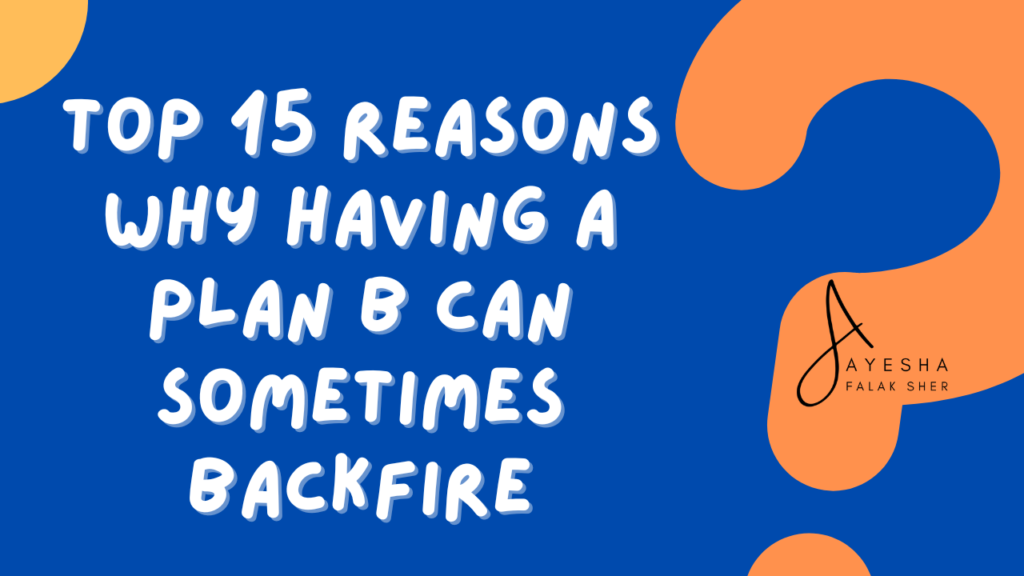In life, you often hear about the importance of having a backup plan, or a “Plan B,” in case your original plans don’t work out.
But have you ever stopped to think that relying too much on a backup plan might actually hinder the success of your main plan, or “Plan A”?
While it might seem counterintuitive, having a fallback option can lead to complacency, lack of focus, and divided efforts.
In this article, we will explore 15 reasons why having a Plan B can sometimes hinder achieving your primary goals.
By understanding the potential pitfalls of relying too heavily on a backup plan, you can better assess when it’s truly beneficial and when it might be holding you back.
So, let’s dig into the article to read why, sometimes, having a Plan B might not be the best strategy for achieving your goals.
Table of Contents
ToggleTop 15 Reasons why having a Plan B can Sometimes Backfire

Here are 15 reasons why having plan B is holding you hostage from achieving your goal:
1. Divided Focus:
When you have a backup plan, dividing your attention between Plan A and Plan B is natural.
Instead of putting all your energy into making Plan A successful, you might constantly worry about what will happen if it fails.
For Example
Imagine you’re studying for an important exam but have a backup plan to retake the test if you don’t pass.
Rather than focusing solely on acing the exam, you might spend valuable study time considering alternative strategies.
This divided focus can prevent you from giving your full effort to your primary goal.
2. Lack of Commitment:
Knowing you have a backup plan can make you less committed to Plan A.
After all, if things don’t work out, you always have something to fall back on, right?
For Instance
Suppose you’re working on launching your own business but also considering keeping your current job as a backup.
This safety net might make you less inclined to take risks or invest fully in your entrepreneurial venture.
This lack of commitment can lead to procrastination and a lack of motivation to overcome challenges.
However, if you are the one who likes making plan B, read this article to get to know why sometimes having a plan B is a good idea.
3. Reduced Risk-Taking:
When you have a backup plan, you might hesitate to take risks.
For instance, imagine you have a dream of starting your own business, but you also have a stable job as a safety net.
You might feel reluctant to quit your job and invest fully in your business idea because you’re worried about losing your fallback option.
As a result, you might miss out on potentially groundbreaking opportunities and settle for a safer, less fulfilling path.
4. Complacency:
The presence of a Plan B can lead to complacency.
For example, suppose you’re studying for an important exam, but you also have the option to retake it if you fail.
You might not put in your best effort because you know there’s a safety net in place.
This complacency can prevent you from reaching your full potential and settling for mediocre results instead of striving for excellence.
5. Fear of Failure:
Ironically, having a backup plan can actually increase your fear of failure.
Failure doesn’t seem as scary when you have a safety net because you know you have something to fall back on.
However, this fear can hold you back from taking risks and pursuing your dreams wholeheartedly.
For Instance
Imagine you have a dream of starting your own business.
You’ve spent years planning and saving up, but because you have a backup plan of returning to your old job if things don’t work out, you might not give your business your all, fearing the consequences of failure.
6. Delayed Decision-Making:
Having a Plan B can lead to indecision.
You might spend too much time weighing the pros and cons of each option, and you may be unable to commit to either Plan A or Plan B.
This indecision can waste valuable time and prevent you from progressing toward your goals.
For Example
Suppose you’re offered two job opportunities: one aligns with your passion (Plan A), while the other offers more stability and a higher salary (Plan B).
You may find yourself stuck in a cycle of indecision, unable to choose between pursuing your passion and opting for security, ultimately delaying your decision and potentially missing out on both opportunities.
7. Lowered Ambition:
Knowing that you have a backup plan can make you less ambitious.
Instead of aiming for the stars, you might settle for less because you fear risking your backup plan.
As a result, you might miss out on opportunities for growth and success.
8. Wasted Resources:
Maintaining a backup plan requires time, effort, and resources.
You might spend valuable resources developing and maintaining your backup plan instead of investing them in making Plan A successful.
This allocation of resources can hinder your progress and prevent you from achieving your goals efficiently.
9. Self-Limiting Beliefs:
Having a backup plan can reinforce self-limiting beliefs.
You might start to doubt your ability to achieve your primary goal, believing that you need a safety net because you’re not capable of success on your own.
These negative beliefs can become self-fulfilling prophecies, undermining your confidence and performance.
10. Missed Opportunities:
Focusing too much on your backup plan can cause you to miss out on opportunities that could help you achieve your primary goal.
You might be so preoccupied with preparing for failure that you fail to recognize and seize opportunities for success.
As a result, you might fall short of your potential and regret not taking advantage of these opportunities.
11. Overlooking Alternatives:
Having a backup plan can blind you to alternative paths to success.
You might become so fixated on your primary goal and its backup plan that you fail to consider other options that could lead to even greater success.
By limiting your perspective, you might miss out on innovative solutions and unconventional approaches that could propel you toward your goals.
12. Negative Impact on Motivation:
Knowing that you have a Plan B can dampen your motivation.
Instead of being driven by a burning desire to achieve your primary goal, you might become complacent, knowing you have a safety net to catch you if you fall.
This lack of motivation can hinder your performance and prevent you from giving your best effort.
13. Unrealistic Expectations:
Having a backup plan can give you a false sense of security.
You might overestimate the likelihood of failure and underestimate your ability to succeed without a safety net.
As a result, you might set lower expectations for yourself, believing that failure is inevitable and that success is out of reach.
14. Underestimating Resilience:
Having a backup plan can cause you to underestimate your own resilience.
You might doubt your ability to bounce back from failure, assuming you’ll need your backup plan to save you.
However, resilience is a powerful trait that can help you overcome setbacks and emerge stronger than ever.
15. Limiting Growth:
Relying too much on a backup plan can stunt your personal and professional growth.
Instead of pushing yourself out of your comfort zone and challenging yourself to achieve your full potential, you might play it safe, sticking to the familiar and avoiding risks.
This fear of failure can prevent you from growing and evolving into the best version of yourself.
Conclusion:
While having a backup plan, or “Plan B,” can provide a sense of security and reassurance.
It’s essential to recognize the potential drawbacks it may pose to the success of our primary goals, or “Plan A.”
From fostering a fear of failure to inducing delayed decision-making, relying too heavily on a backup plan can hinder our ability to commit to and achieve our main objectives fully.
It’s crucial to balance preparedness and wholehearted pursuit of our dreams.
By acknowledging these 15 reasons why having a Plan B can hinder Plan A’s success, we can approach our goals with clarity, focus, and determination, maximizing our chances of accomplishing what truly matters to us without allowing fear or indecision to stand in our way.
Ultimately, success often requires persistent dedication and the willingness to take calculated risks, even if it means foregoing the safety net of a backup plan.
Are you looking for content that stands out and tells your story? Look no further!
Let’s work together to showcase your message.
I’ve got you covered whether you need captivating blog posts, helpful articles, or persuasive marketing material.
Your voice matters and I’m here to help it be heard.
Reach out to me today and let’s make your brand or message shine.









